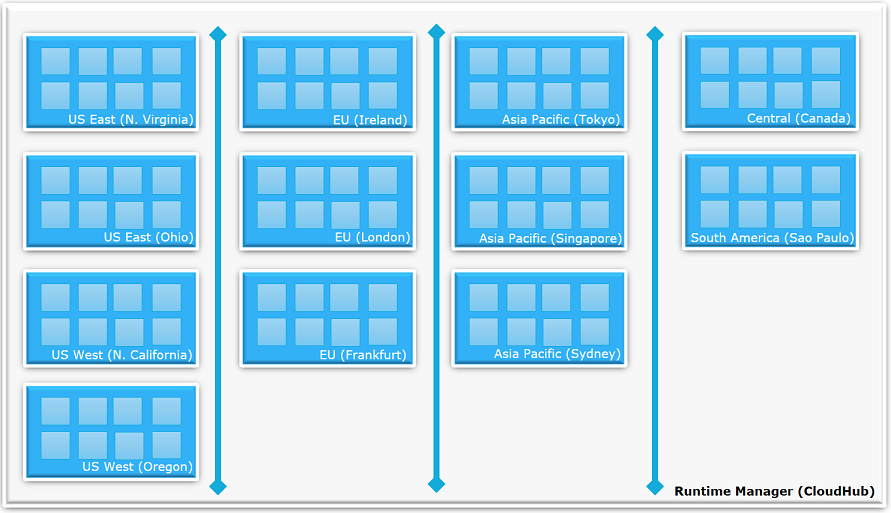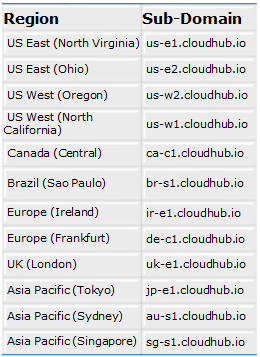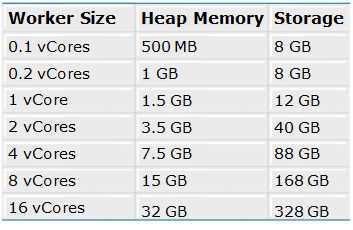MuleSoft CloudHub is Multitenant Integration Platform as a Service
CloudHub is a multitenant integration platform as a service and can hosted the worker cloud in multiple regions distributed across the world.
Join the DZone community and get the full member experience.
Join For FreeThis article will explain why MuleSoft is called as a Multitenant integration platform as a service (iPaaS). It will also covers various capabilities provided by CloudHub like Auto Healing, Scalability, High Availability etc.
Introduction
Multitenancy is the word often used in the cloud computing world. In the cloud computing, there are multiple tenants or customers of the cloud vendor shares the same computing resources like underlying hardware. Even tenants share the resources but they are not aware of each other and data is also isolated and secured from each other.
Generally, one server with high configuration may be not efficient for one tenant and that tenant may not utilized the all the computing resources allocated to the server. It is always good to share that machine among the multiple tenant that can maximize the use of the resources and reduce the cost for the tenants as server is shared among multiple tenants.
In SaaS offerings, single computer software or web applications can be served by multiple unique users or users groups.
Multitenancy
MuleSoft Cloudhub is the designed to provide enterprise multitenant, secure, elastic and high available Integration Platform as a Service. In the MuleSoft, management console and platform services "shared everything" architecture. Anypoint Platform user interface, load balancers, monitoring services are shared among the multiple tenants. These services will not process or transmit your data.
MuleSoft worker cloud is multitenant cloud of virtual machines. These VMs are the secured and provides required isolation to run your integration application without affecting others.
CloudHub offers worker clouds in the 12 region (4 North America, 3 EU, 3 Asia Pacific, 1 Central and 1 South America) and global distribution allows you deploy the applications near to you or your datacenter and this will reduce the latency.

Each region has different sub domain and domain provided to you depending on the region where you deploy the application and the name of the application.
For example, if your application name is invoice-app and deployed in US East (North Virginia) region, domain name will be invoice-app.us-e1.cloudhub.io.
Below are the list of subdomain depending on the region where you deploy the application.

Integration Application on the CloudHub worker can be deployed easily with single click in the region that distributed across the world. CloudHub offers the platform-as-a-service to develop, test and run the complex integration in the cloud.
For more details on the operational and API capabilities, please read article https://dzone.com/articles/different-mulesoft-operational-model..
Applications deployed in the CloudHub choose the IP address from AWS IP ranges assigned for the region. Here is full list of IP ranges for each AWS region https://ip-ranges.amazonaws.com/ip-ranges.json
CloudHub is offering various other features like Zero Downtime Updates, Intelligent Healing, High Availability, Auto Scaling, Scalability.
Worker and Worker Size
Workers are dedicated instances of Mule runtime engine that run your integration applications on CloudHub. Worker sizes have different compute, memory, and storage capacities.

Intelligent Healing
CloudHub continuously monitors the worker clouds and provide self healing mechanism to recover worker cloud from the any issues or problems. In case of any underlying hardware failure or Availability zone goes down, application will automatically restart in other Availability zone in same region or recover by self.
Zero Downtime Updates
In case, if you are modifying or redeploying the application so end users of your HTTP APIs experience zero downtime. While you are redeploying the application, old version of application is keep running and domain is pointed to the old version of application till redeployment or changes are in the place for new uploaded application version.
Auto Scaling
CloudHub allows you to defined the policies for Auto Scaling so application can be Scale up or Scale down automatically depending on the memory and CPU usage.
Scalability
Application deployed to the CloudHub can be easily scalable by increasing the number of Worker or Worker Size. Horizontal Scaling can be easily done by increasing the number of worker instances and Vertical Scaling can be easily done by increasing computing resources like worker size (vCores).
High Availability
Application deployed to the CloudHub can be easily made High Available just by deploying the application on the multiple cloud worker instances.
Here is the more details https://dzone.com/articles/deploying-mulesoft-application-on-1-worker-vs-mult
We had discussed what are the different capabilities provided by CloudHub and MuleSoft is a Multitenant Integration Platform as a Service.
Now, you know why we call CloudHub as a Multitenant iPaaS.
Opinions expressed by DZone contributors are their own.

Comments